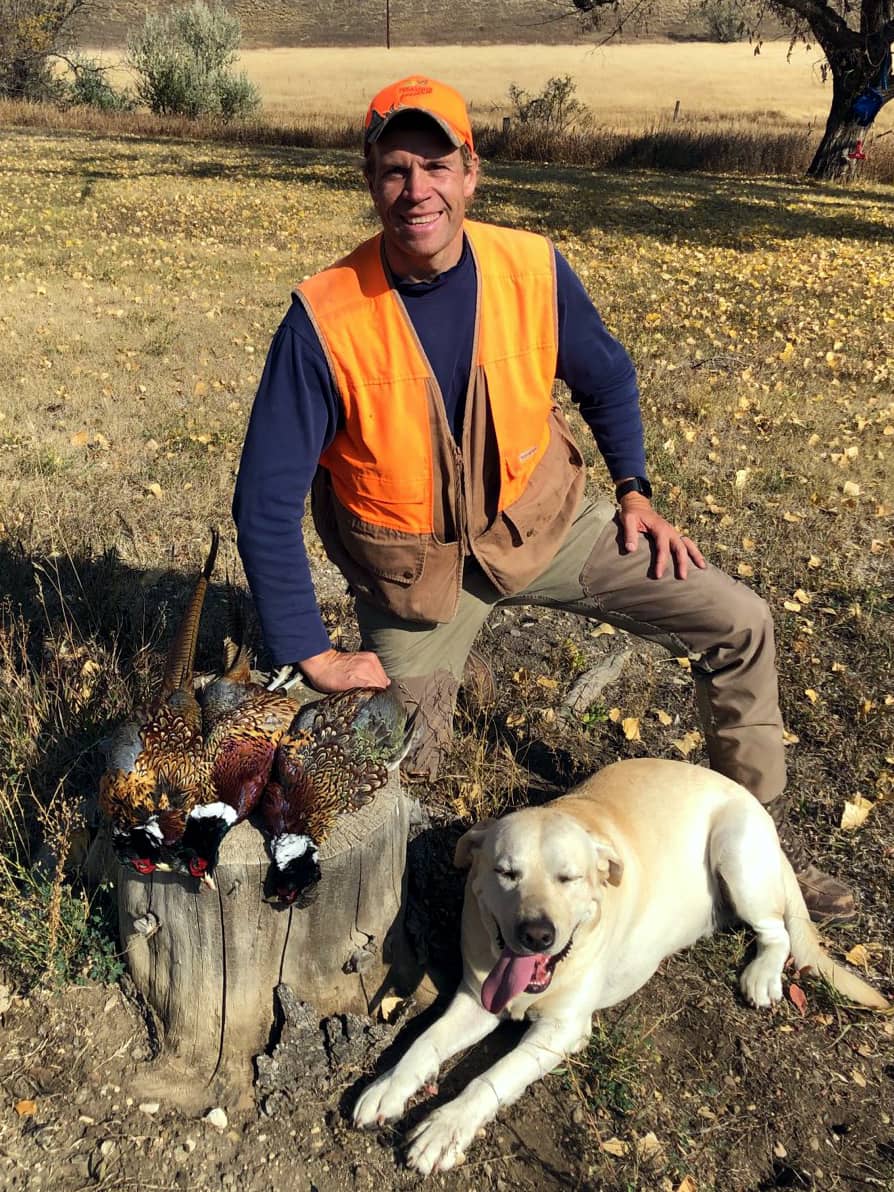
Three in the Wind. The author pauses after picking up his limit of three rooster pheasants in the breezy conditions of North Dakota’s pheasant opener. Simonson Photo.
By Nick Simonson
Beyond the usual celebration of dog and bird and of field boots and swinging shotguns, this year’s pheasant opener was highlighted by another frequent autumn occurrence in the upper Midwest: gusty conditions.
In the gales that topped forty miles per hour on one stretch of my first weekend walks, the pines around me in the tree belt howled in a way that made me nervous that branches would start falling at any moment. More than a couple of times I had to adjust the Velcro strap on my already-turned-backwards blaze orange hat to lock it in place from the winds. It should be no surprise, however, that breezes are part of the bird hunting experience on the northern plains, and on a near-national-holiday like pheasant opener, a hunter is headed out regardless of the gusts. What follows are some tips for finding birds when the wind rises, be it at the beginning of the season or as winter approaches at its end.
Look for Cover
Like other animals, pheasants will seek shelter when the wind gets high, in part to be aware of predators in the noisy rush and in part to just get out of the inhospitable conditions. This respite from the roar can be found behind a stand of spruces, old farm structures, the downwind edge of a thick cattail slough or even the backside of a high grassy hill that blocks or quiets the wind. Overgrown shelterbelts with lots of wood, grass and brushy cover at their bases are also great place to find pheasants in the wind. Working these areas slowly and methodically will help a dog adjust to the swirl of the gusts. Note that once found, or bumped from their resting spot, many roosters will wait until they’ve been pushed to the edge of cover to take flight.
Look Ahead
Many times the wind will carry the scent down a draw from the upwind side of a stretch of cover where birds have been holding for a while. The longer they’ve been in place, say if it’s been an all-day wind and they’ve been set in their hiding spot since dawn, the more powerful that river of scent is going to be for Rover’s nose. Many times a dog will scent-check the air by lifting its head and pick up on something distant before starting to move a little faster. The intensity of the pursuit will ramp up as the sitting birds are approached. It’s important to note however, that in the windy conditions, birds are often spookier and they may scatter as dog and hunter near. Pay close attention to the way a dog reacts to scent on the wind, and expect to step up your speed as the dog does, keeping a close eye on what’s ahead in the cover, and where it ends as birds will likely flush when pushed to its edge or a natural barrier, such as a small rise.
Look a Little Longer
In addition to the increased challenges of getting roosters to take to the air, finding a downed bird in the wind can be more difficult for a dog. Make it a point to mark the bird’s location as it falls and note how the wind is blowing. Bring a dog around to a point slightly downwind of where the rooster likely fell and allow it to inspect the area. Be patient as the scent profile has only just set up and the gusts will be blowing the newly-set olfactory cues around.
Give the pup ample time to find the bird and continue to work from the downwind side of the area if more than one attempt at a retrieve is needed. Try not to walk around or between where the bird likely is and where the dog is working, as game pouches and boots can carry scents which may throw a dog off the recovery. Allow for some extra time in the process to recover more birds downed on windy days.
While one can never truly beat the wind when it rises to hat-lifting levels, there are ways to adjust to the challenge. Knowing where birds will be to avoid the gusts, how they will move when approached, and the best ways to put them in the bag after the shot will help improve your odds when you just have to be in the field.
Put these tips together for a successful start to the season and all the way through what is typically windiest portion but still one of the best times of the year…in our outdoors.
